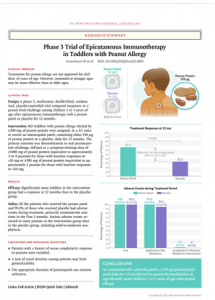A recent clinical trial has shown that a “peanut patch” worn on the skin could provide protection for toddlers with potentially life-threatening peanut allergies (Figure 1).
This patch functions as a form of immunotherapy by gradually exposing peanut-allergic children to small amounts of peanut protein over time, aiming to train their immune systems to tolerate it better. The trial discovered that two-thirds of toddlers who wore the patch daily for a year experienced a significant reduction in their sensitivity to peanut protein. These children were able to consume one to four peanuts without suffering an allergic reaction. The ultimate goal of immunotherapy is to prevent a severe reaction if a child accidentally ingests a small quantity of peanut.
The tested patch, known as Viaskin and developed by DVB Technologies, a French biotech company, has yet to receive approval from the U.S. Food and Drug Administration (FDA). Currently, there are no FDA-approved treatment options available for children under four years old. The researchers also expressed interest in exploring if the same skin-based desensitization method could be effective for other common food allergens since many individuals with peanut allergies are also allergic to other foods.
While this treatment development is promising, it’s important to note that peanut allergies can be prevented by introducing peanut products into babies’ diets when they begin consuming solid foods. By early exposure, the risk of developing peanut allergies can potentially be reduced.
Journal article: Greenhawt, M., et al., 2023. Phase 3 Trial of Epicutaneous Immunotherapy in Toddlers with Peanut Allergy. New England Journal of Medicine.
Summary by Stefan Botha











